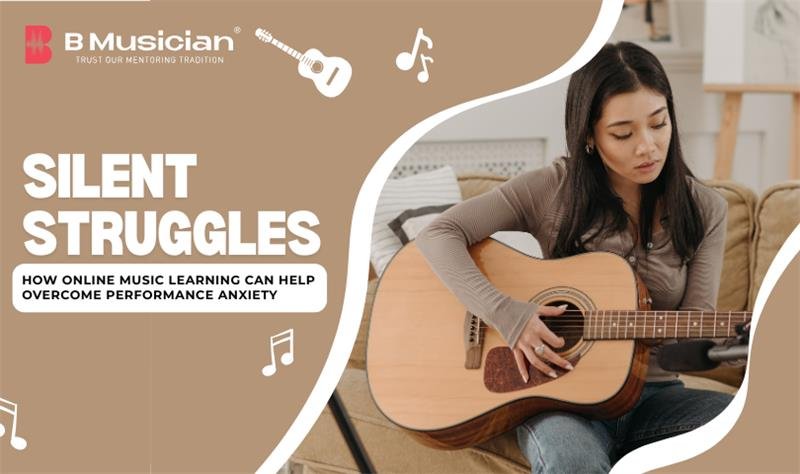Introduction: The Hidden Battle Behind Every Note
Music is often celebrated for its power to express emotions, heal, and bring people together. But for many musicians, especially beginners and even seasoned performers, behind each performance lies an invisible enemy: performance anxiety in music.
This anxiety doesn’t discriminate. Whether you’re a violinist preparing for a solo recital, a vocalist joining an online jam session, or a guitarist uploading your first YouTube cover, the fear of judgment, failure, and making mistakes can be paralysing. Thankfully, with the rise of online music learning, many students are finding a safe and empowering way to gradually overcome this silent struggle.
We’ll explore the psychological roots of performance anxiety, how it affects musicians, and why online platforms might just hold the key to building confidence and long-term emotional resilience in musical practice.
What Is Performance Anxiety in Music?
Performance anxiety in music often referred to as “stage fright” is a form of social anxiety that manifests when a person is expected to perform in front of an audience. It’s not merely “nervousness”; it can involve a range of symptoms:
- Sweaty palms
- Rapid heartbeat
- Shaky hands or voice
- Nausea
- Mental blocks or memory lapses
- Avoidance of performance situations altogether
According to the British Journal of Psychology, over 60% of musicians experience moderate to severe performance anxiety during their careers. The roots often trace back to fear of judgment, perfectionism, low self-esteem, or past traumatic experiences in performance settings.
Why Classic Music Training Can Sometimes Amplify Anxiety
Classical music training, while rigorous and rewarding, can unintentionally cultivate high-pressure environments. Public exams, juried performances, and critical teacher feedback are standard, but these can sometimes increase stress in students who are already vulnerable.
In traditional classroom or one-on-one setups, students may feel under constant scrutiny. Mistakes are often highlighted more than progress, and this hyper-focus on perfection can reinforce negative self-talk an internal dialogue like “I’m not good enough” or “One wrong note and I’ll fail.”
While these methods have their merits, there’s an increasing need for a gentler, more emotionally intelligent alternative and that’s where online music learning steps in.
The Online Shift: A Safe Space for Growth
The transition to music courses accelerated during the pandemic and opened new possibilities. Here’s how virtual learning platforms are helping students combat performance anxiety in music:
1. Private, Judgment-Free
Learning in the privacy of one’s home reduces the psychological pressure of being watched. Students can record their sessions, practice without time constraints, and review materials without embarrassment. This creates a sense of safety, which is essential for confidence building.
2. Pacing and Control
Unlike fixed classroom timings, online music platforms allow learners to choose their own pace. The ability to pause, repeat, and practice a piece until it feels “right” removes the fear of not keeping up, and nurtures internal motivation over external approval.
3. Exposure Therapy Through Gradual Sharing
Many apps and courses encourage students to record and submit their playing. This acts like exposure therapy, a proven psychological technique used to treat anxiety. Over time, this gradual exposure—starting from solo recordings to live sessions helps desensitize students to the fear of being heard or judged.
Psychological Science Backs It: Why Online Learning Works
Research in cognitive behavioural therapy (CBT) and social learning theory supports the idea that controlled, low-stakes exposure to stressors helps reduce anxiety over time. In a 2019 study published in Psychology of Music, students who practiced and shared recordings of their performances regularly reported a 25% reduction in performance anxiety compared to those in traditional conservatory environments.
Another benefit? Mirror neurons in the brain that fire both when we perform an action and when we observe it help online learners absorb and imitate confident playing styles by watching instructors or peers. This subconscious learning enhances technique and self-assurance.
Music Performance Anxiety Tips for the Online Learner
If you’re struggling with performance anxiety in music, the following tips can make your online learning journey smoother and more empowering:
1. Start With Low-Stress Goals
Instead of aiming for “perfect,” aim for “progress.” Record a 30-second clip of your practice session and store it just for yourself. Over weeks, track your improvement. This alone can start reshaping negative self-beliefs.
2. Create a Ritual Before Playing
Performance rituals—like deep breathing, light stretches, or a simple mantra—can help calm your nervous system. Over time, these routines become neural cues that signal your brain it’s “safe” to perform.
3. Share With a Supportive Online Community
Whether it’s a private Facebook group, a Discord server for musicians, or an app-based learning cohort, connecting with fellow learners can help normalize your anxieties. You’ll discover others have the same fears—and the same victories.
4. Watch and Imitate Confident Performers
Spend time watching confident online performers, not just for technique but for stage presence. Analyze their body language, facial expressions, and breathing. Visual imitation boosts your own belief that you can do it too.
5. Include Relaxation Techniques in Practice
Online music lessons can be structured to include 5–10 minutes of mindfulness or guided relaxation. Apps like Calm or Headspace, combined with practice, reduce cortisol levels and enhance focus.
Real-Life Stories: Students Who Found Their Voice Online
A classical example from my own student Abhay, a 14-year-old violin student from Pune, says he almost gave up music after a panic attack during a school performance. His parents enrolled him in an online music theory lesson program, thinking it would just keep him engaged during the lockdown.
“Within three months, I was recording videos and even doing Zoom performances with friends. I realised I wasn’t afraid of playing, I was afraid of people. The screen gave me a healthy distance to rediscover my love for the violin.”
Srinidhi, a college student from Texas, took up the western violin as a hobby. Despite early technical progress, she never played in front of others. Through online lessons and guided performance challenges, he began to post short reels on Instagram.
“Now, people encourage me instead of judging me. I’ve even done two live Instagram performances. I still get nervous—but it doesn’t stop me anymore.”
Building a Healthy Musical Mindset for Life
Overcoming anxiety in music isn’t about becoming fearless; it’s about building courage in the face of fear. Online music lessons provide a unique ecosystem where learners can:
- Progress at their own pace
- Rewire their self-perception
- Learn to perform without panic
- Transform internal criticism into artistic confidence
By shifting the focus from judgment to joy, from perfection to progress, online learning nurtures not just better musicians but mentally stronger ones.
Conclusion:
Performance anxiety may be one of the least talked about but most deeply felt challenges in a musician’s journey. With the flexibility, privacy, and emotional safety that online platforms offer, learners can finally approach music as a form of healing, not harm.
So, whether you’re just beginning or trying to fall back in love with your instrument after years of fear, know this: you are not alone. And the silent struggle can, indeed, be overcome with the right support, mindset, and the tools that online music lessons bring.
Because every note you play matters. And every voice deserves to be heard.
























